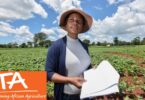Call For Applications: Adaptation Fund Climate Innovation Accelerator
Do you have a climate innovation that can enhance communities’ resilience and adaptability for food security? If yes, then apply for the Climate Adaptation Innovation Accelerator Program by the Adaptation Fund and WFP Innovation Accelerator.
Every region of the world is experiencing the effects of climate change, a major driver of global hunger. In the past decade, 1.7 billion people have faced extreme weather events and climate-related disasters. Communities contributing the least to the climate crisis suffer the most, with limited coping means. The WFP Innovation Accelerator, with support from the Adaptation Fund, has launched the Climate Adaptation Innovation Accelerator Program as part of the Adaptation Fund Climate Innovation Accelerator (AFCIA) partnership. This initiative aims to identify, support and scale high-impact innovations that enhance climate adaptation in vulnerable regions.
We call on innovators, entrepreneurs, and changemakers to bring forward groundbreaking solutions to drive resilience, enhance climate adaptability, and promote sustainable development in affected communities. By strengthening local capacities and fostering partnerships, we strive to enhance climate resilience and contribute to the Sustainable Development Goals (SDGs), especially SDG 2: ‘Zero Hunger’ and SDG 13: ‘Climate Action’.
What we offer
This partnership between the WFP Innovation Accelerator and the Adaptation Fund through the Climate Adaptation Innovation Accelerator Program aims to enhance climate adaptation and gender equity, foster inclusive economic opportunities, engage youth, and increase community resilience. By supporting groundbreaking climate innovations, the program will boost local, regional and global collaborations, expand the knowledge base for climate adaptation, and deliver sustainable solutions for vulnerable populations, contributing to the Sustainable Development Goals and building a more resilient future for communities worldwide.
Innovation Consultancy: Expert innovation management assistance from the WFP Innovation Accelerator.
Access to WFP’s field operations: Access to WFP’s field operations and opportunity to engage in comprehensive field testing.
Funding: More than US$ 1 million in equity free funding will be available for 8-10 startups that will be admitted to the sprint program through competitive grants based on the stage of your solution.
Mentor Support: Six-month Sprint Program combining business-oriented training, mentoring, and technical assistance from the WFP Innovation Accelerator. Access to a diverse pool of mentors from top-tier organizations in various sectors.
Visibility: Extensive visibility across multiple WFP social media channels and other platforms. Access to a diverse pool of mentors from various sectors and top-tier organizations. Exposure to national and international funders through an online pitch event at the end of the program.
We Are Looking For
For this Innovation Challenge, the WFP Innovation Accelerator is looking for both low- and high-tech solutions specifically tailored to meet distinct climate adaptation challenges in Egypt, Jordan and Lebanon along the food system value chain. We aim to identify and support exceptional innovations from around the world that hold the potential to address these challenges in three target countries.
Egypt
In Egypt, we invite applications for innovations, including but not limited to those that enable affordable climate information services and early warning systems for smallholder farmers, off-grid and low-cost groundwater desalination for agriculture, affordable smart irrigation, and solutions for climate-adaptive livelihoods and youth employment opportunities in vulnerable communities. Please read the call for applications document for our complete list of priority areas.
Jordan
In Jordan, we invite applications for innovations, including but not limited to those that enhance agricultural productivity and resilience: soil conditioners for better water retention in arid regions, affordable complementary irrigation technologies, non-GMO drought-tolerant crop varieties, solutions to convert agricultural and organic waste into inputs or animal feed, and systems that aggregate smallholder farmers’ supply for transparent, fair market access. Kindly read the call for applications document for our complete list.
Lebanon
In Lebanon, we invite applications for innovations, including but not limited to those that enable precision agriculture solutions to monitor soil and crop health, affordable off-grid irrigation technologies, pest and livestock health management, innovative financing solutions for smallholder farmers and agro-processors, and solutions that convert agricultural and food waste into affordable inputs such as compost, biochar, organic fertilizers, or animal feed. Kindly read the call for applications document for our complete list.
Eligibility Criteria
- Your organization must be an established legal entity (for-profit, not-for-profit, social business, NGO, INGO).
- Your organization should have a presence or willingness to build a presence in one of the three countries of implementation (Egypt, Jordan, Lebanon). This could take the form of a country office or other permanent presence, subsidiary, long-term operations or partnerships in the country.
- Your innovation addresses at least one of the above-mentioned priority areas related to pressing challenges faced in the climate adaptation space of the country of implementation.
- Your innovation must be at least in the seed stage. Solutions that are still at the idea, research or early pre-seed stage are not eligible.
- Your innovation should have a clear pathway to scale, adequate resources and a proposed plan to implement during the six-month
- Sprint Programme with the available funding.
- Applicants are expected to have strong intentions to collaborate with relevant humanitarian stakeholders, build relationships with the country offices, and connect with the innovation ecosystems.
- Interventions classified as Category A based on the environmental and social sustainability framework indicating a high risk of irreversible adverse impacts, will not be accepted. For further details on risk categories, kindly refer to WFP’s environmental and social sustainability framework, specifically paragraph 23 on page 8.
Deadline: August 4, 2024






